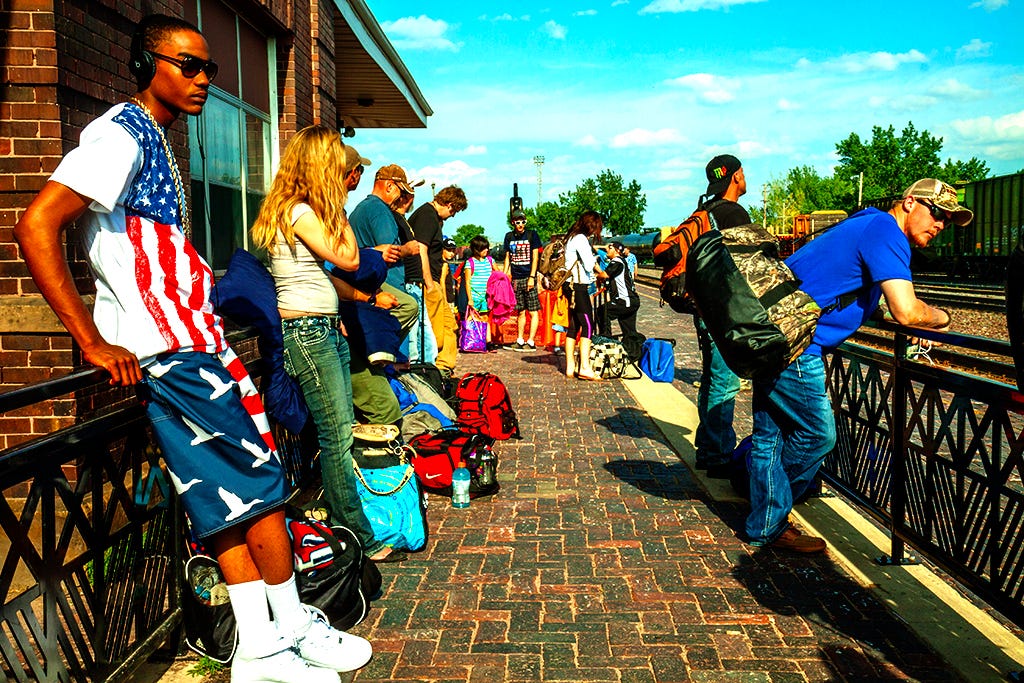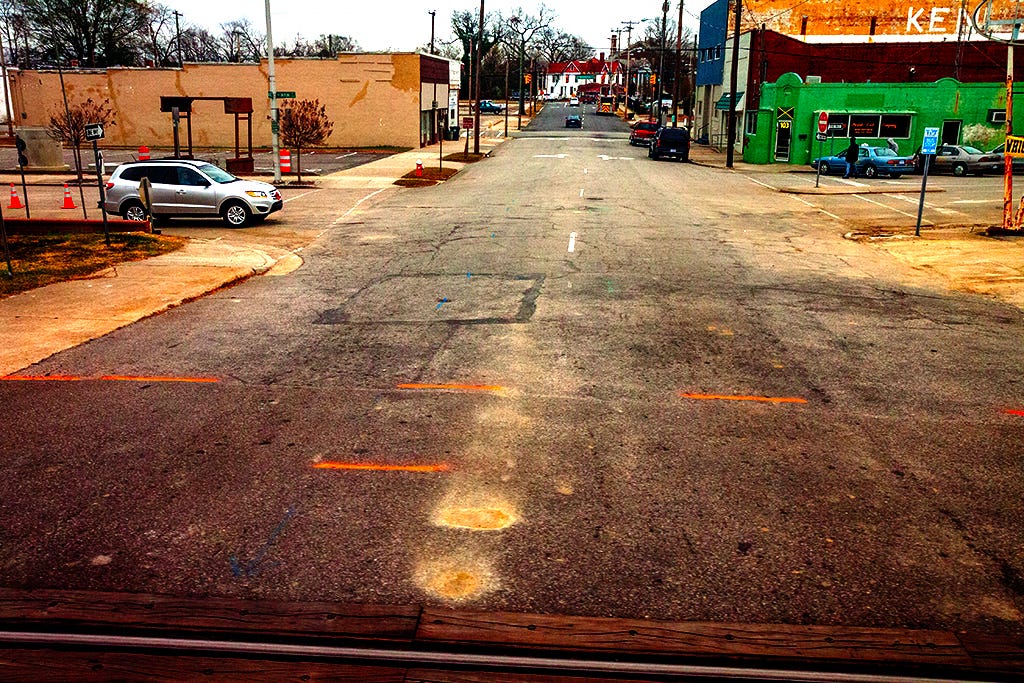[7/4/14 on Amtrak train traveling through Wisconsin]
It’s too obvious. Shut in Dickinson is the anti Whitman, with his “Song of the Open Road,” “Salut Au Monde!” and “Passage to India,” etc. Fearful of alien places, strangers, sidewalks, maps, fresh air and clouds, Dickinson was safe in her alabaster chamber.
By contrast, here’s a robust, confident and exuberant Whitman strutting forth:
Afoot and light-hearted I take to the open road,
Healthy, free, the world before me,
The long brown path before me leading wherever I choose.
Henceforth I ask not good-fortune, I myself am good-fortune,
Henceforth I whimper no more, postpone no more, need nothing,
Done with indoor complaints, libraries, querulous criticisms,
Strong and content I travel the open road. Later in the same poem:
I think heroic deeds were all conceiv’d in the open air, and all
free poems also,
I think I could stop here myself and do miracles,
I think whatever I shall meet on the road I shall like, and who-
ever beholds me shall like me,
I think whoever I see must be happy. Not just physical feats but unfettered creativity has all been conceived beyond walls. Since Dickinson rarely ventured outside, her poems must be suffocated, constipated and shackled, no? Denied normal outlets, her passions were comically weird. When I first read her “Wild nights - Wild nights!” at age 18 or 19, I cringed. It’s that anguished period in life where fancied congress is constantly in session, but it doesn’t have to sound so hysterically pathetic:
Wild nights - Wild nights! Were I with thee Wild nights should be Our luxury! Futile - the winds - To a Heart in port - Done with the Compass - Done with the Chart! Rowing in Eden - Ah - the Sea! Might I but moor - tonight - In thee!
Though I may have been the first to translate Dickinson into Vietnamese, I haven’t read her very attentively. I prefer a more vivid, tactile and smelly poetry. Dickinson’s world is very ethereal, just like our two photos of her, with the second only discovered 126 years after her death. We don’t meet anyone or go anywhere in Dickinson’s poems. Even when there’s a rare name, Katie, Sue, Rhine, we don’t see anyone or anything. There’s no presence. Dickinson preferred symbols:
Make me a picture of the sun - So I can hang it in my room - And make believe I’m getting warm When others call it “Day”
Just strip naked and frolic outside for an hour, Emily! Feel that vitamin D on your pubis! Sorry, couldn’t resist that near rhyme. Look up that other lonesome goofball! He’s just over yonder. Check out this suggestive tidbit:
I trod on a large black snake, which, as soon as I stepped again, went off swiftly down the hill toward the swamp, with head erect like a racer. Looking closely I found another left behind, partly concealed by the dry leaves. They were lying amid the leaves.
Thoreau has two snakes! You ain’t got none! My bad, Miss Dickinson, I ain’t got no manners. Fresh off the boat, I’m, again, looking for my lost paddle.
Like everything else, boats and seas were to Dickinson mere abstractions. Here, the ocean symbolizes the vastness of her pain:
You left me Boundaries of Pain – Capacious as the Sea – Between Eternity and Time – Your Consciousness – and me –
More lifeless seas from Dickinson:
On this wondrous sea Sailing silently, Ho! Pilot, ho! Knowest thou the shore Where no breakers roar - Where the storm is o’er?
*
Exultation is the going Of an inland soul to sea, Past the houses - past the headlands - Into deep Eternity -
*
To tell the Beauty would decrease To state the Spell demean There is a syllable-less Sea Of which it is the sign -
You get the drift. Now, here is a Whitman ocean:
You sea! I resign myself to you also—I guess what you mean, I behold from the beach your crooked inviting fingers, I believe you refuse to go back without feeling of me, We must have a turn together, I undress, hurry me out of sight of the land, Cushion me soft, rock me in billowy drowse, Dash me with amorous wet, I can repay you.
Of course, Whitman had to let it rock. He’s always agape. Though Whitman can also be too abstract, he’s more vivid and tactile than just about anybody, even now. Constantly among others with their unpredictable autonomy, Whitman was relentlessly provoked, tickled or titillated:
Mine is no callous shell, I have instant conductors all over me whether I pass or stop, They seize every object and lead it harmlessly through me. I merely stir, press, feel with my fingers, and am happy, To touch my person to some one else’s is about as much as I can stand.
Here’s Whitman’s most astounding outburst:
O hymen! O hymenee!
Why do you tantalize me thus?
O why sting me for a swift moment only?
Why can you not continue? O why do you now cease?
Is it because, if you continued beyond the swift
moment, you would soon certainly kill me?Though Anne Gilchrist never mentioned that in her rousing “An Englishwoman’s Estimate of Walt Whitman,” “O hymen” must have seized her. For six years, this London widow wrote to the queer bard to profess love. Since Whitman was only cordial, Gilchrist had to move to Philly in 1876 to seduce, eyes to eyes, breath to breath and flesh to flesh, this perfect American. The widow disembarked with three of her four kids, plus all her books, furniture, china, paintings and silverware. Two months it took to cross that choppy Atlantic. Awaiting her was an ecstatic coexistence with this most virile yet most intellectual of men. Of course, it couldn’t have happened.
The fictional or mythical Whitman went both ways, so there was also this:
I am for those who believe in loose delights -
I share the midnight orgies of young men,
I dance with the dancers, and drink with the drinkers,
The echoes ring with our indecent calls,
I take for my love some prostitute - I pick out some
low person for my dearest friend,
He shall be lawless, rude, illiterate - he shall be one
condemned by others for deeds done; Though gayer than Obama, Whitman claimed to have six illegitimate children. Mythologizing the US also, Whitman declared it was “not merely a nation but a teeming nation of nations.” An embodiment and culmination of the world, America was also its future. A long-awaited harmony would be established:
I believe the main purport of these States is to found a superb
friendship, exaltè, previously unknown,
Because I perceive it waits, and has been always waiting, latent in
all men.Even after all the mayhem and carnage cause by “these States,” billions still believe in this promise. Whitman’s vision can even be construed as globalist:
Lo, soul, seest thou not God’s purpose from the first? The earth to be spann’d, connected by network, The races, neighbors, to marry and be given in marriage, The oceans to be cross’d, the distant brought near, The lands to be welded together.
If contemporary man wasn’t so illiterate, the World Economic Forum would have claimed and trumpeted such a passage. The New World Order mandates mass idiocy. We’re already in a sub, sub, sub basement, but there’s no bottom to this nadir. It’s impossible to imagine Justin Trudeau, Boris Johnson or Jacinda Ardern quoting Whitman. As for American politicians, their cretinism is perfectly tailored for an audience that has strained relentlessly to earn each utterance by Trump, Biden, Harris, Pelosi, Ocasio-Cortez or Graham, etc.
On the surface, Dickinson can’t be more different from Whitman, but he was also isolated. Though Whitman experienced much more, he was barely touched. Like everybody else, he mostly just looked, if more lustingly:
City of Orgies
City of orgies, walks and joys!
City whom that I have lived and sung in your midst will one day make
you illustrious,
Not the pageants of you—not your shifting tableaux, your spectacles,
repay me;
Not the interminable rows of your houses—nor the ships at the
wharves,
Nor the processions in the streets, nor the bright windows, with
goods in them;
Nor to converse with learn’d persons, or bear my share in the soiree
or feast;
Not those—but, as I pass, O Manhattan! your frequent and swift flash
of eyes offering me love,
Offering response to my own—these repay me;
Lovers, continual lovers, only repay me.Teeming cities are cock and cunt teases. Mostly, Whitman touched himself. We’ve seen Whitman intertwined with the sea. Here, he’s amorous with a creek:
I will go to the bank by the wood and become undisguised and
naked, I am mad for it to be in contact with me.Who needs water? Air alone is enough:
My respiration and inspiration, the beating of my heart, the pass-
ing of blood and air through my lungs,
The sniff of green leaves and dry leaves, and of the shore and
dark-color’d sea-rocks, and of hay in the barn,
The sound of the belch’d words of my voice loos’d to the eddies
of the wind,
A few light kisses, a few embraces, a reaching around of arms,
The play of shine and shade on the trees as the supple boughs
wag,Did you see anyone showing up? Who’s giving Whitman “light kisses” and “embraces”? At best, it’s something remembered. Warhol, “Sex is nostalgia for sex.” Dickinson, too, had to belch up some distant episode:
Had I known that the first was the last I should have kept it longer. Had I known that the last was the first I should have drunk it stronger. Cup, it was your fault, Lip was not the liar. No, lip, it was yours, Bliss was most to blame.
Read badly if at all, Whitman and Dickinson would vomit at what their nation has become. I wonder, though, if Whitman could recognize the exuberance he so well embodied was the seed of this disaster? Unchecked appetite doesn’t just lead to perversion but violence.
No one can blame Whitman. He’s perfect for his time and place. Growing up in a semi rural Brooklyn where roaming pigs and chickens feasted on slop and garbage, Whitman witnessed the appearance of gas lamps, street cars, passenger railroads, ferries and, most importantly, photography. Suddenly, much of the world could be seen, if only in fragments and without colors. Compared to Hawthorne, Melville and especially Twain, Whitman went hardly anywhere, yet he spoke of innumerable places. Having glimpsed photos of Spain, Italy, Turkey, Arabia, China and India, etc., Whitman could exclaim, “Within me latitude widens, longitude lengthens.”
Whitman’s lust for the open road is echoed in Kerouac’s On The Road, of course, but I can’t be alone in hearing it in Chuck Berry’s “Route 66” and Geoff Mack’s “I’ve Been Everywhere,” as popularized in the US by Johnny Cash. In those songs, nothing is described, only place names are rattled off, for we’re well into the age of the automobile. This multitudinous earth just flits by.
Driving slow or fast, you must get off somewhere. With California as terminus, we have Ginsberg’s “A Supermarket in California.” This line alone captures America’s essential barrenness, “I saw you, Walt Whitman, childless, lonely old grubber, poking among the meats in the refrigerator and eyeing the grocery boys.”
The US as spectacle galore has long been unmatched. It turns everything, even street crime, war and death, into nearly irresistible pornography. Touching themselves, Americans eye the rest of the world. Sprung into a nation not quite defined, Whitman could afford to be ecstatic. Dickinson prefigured our solitary confinement.
[Shelby, MT on 7/2/14. Woman is a stripper going to Grand Forks, ND]
[mostly oil workers in Williston, ND on 7/3/14, during the height of the fracking boom]
[Megabus employee making a Mardi Gras dress for herself, New Orleans, 2/24/17]
[Thelonious Monk’s hometown of Rocky Mount, NC on 12/12/11]








Ah, yes as the empire is hollowing out and The West is collapsing on its failed experiment with making itself God, it is wise to contrast these two mindsets. Like Dickenson's work or hate it, she is a testament to the beauty and expanse of the human mind, a rich inner life and the power of the pen. She rarely traveled, yet she could reach so many with her words because there really is something more to being human than visiting or even moving to the most fashionable places and having sexual exploits. Whitman is a victim of the disintegration that the "Enlightenment" led to. Be your own boss. Worship your self and your sensual experiences. What could go wrong? Well, who knew it would lead to population collapse, mass surveillance, censorship, an opioid epidemic, porn addiction, mandatory gene therapy jabs and drag queen story hour, but it did. I have in the past tried to use Whitman to help people snap out of depression that our nihilistic dominant culture leads to, but I now see why that was never going to work. Emily hold us, no doubt b/c she was constrained. I have kept her "Tell all the truth, but tell it slant" close. It is one of the few poems I have memorized. It is advice I need to keep working to better follow. I highly recommend Blaise Pascal's "The Penses" as a response to the unleashing of the intellectual reframing that was taking place in the 17th century that led us here. I am reading a translation with notes from Prof. Peter Kreeft. Even if you reject Catholicism, if you are interested in understanding The West as either a member or its victim, you might want to understand the history of its philosophical underpinnings more fully.
I thought a little hard on Emily, she didn't get out much. Now Walter, yes, he was as pompous as they come.